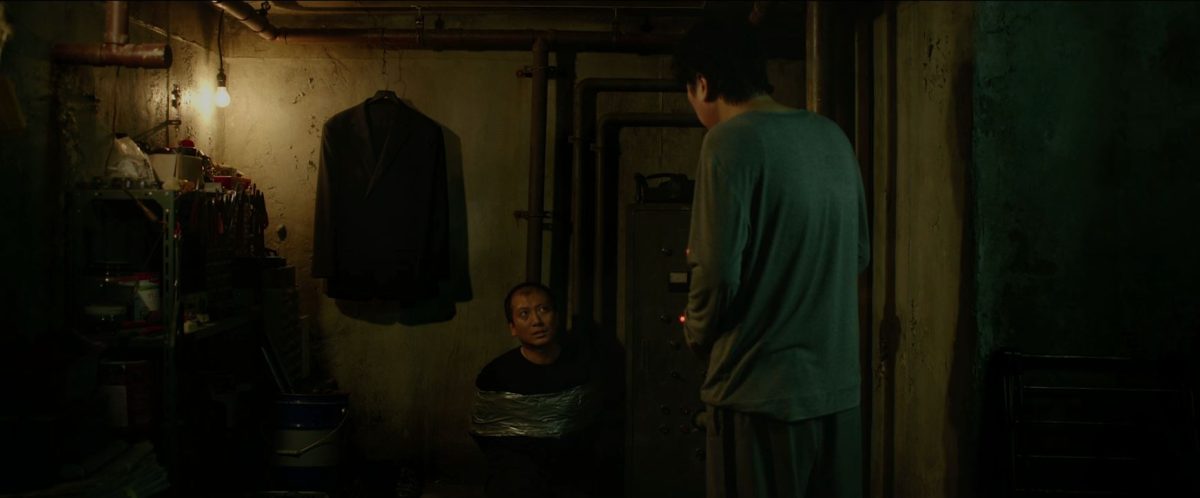Foreword: This is the script of a video I wrote, produced, edited and uploaded in 2021/2022. However, it never made it to public viewing. The video was blocked by copyright strikes regardless of how I edited it, and I eventually abandoned the project because of this. While the video remains on my hard drive (somewhere), it won’t ever be seen on the platform. I don’t intend to make more videos like this – even though it quite legitimately counts as fair use, and I did make this claim in my appeal – it is very difficult to upload videos on films due to the nature of YouTube’s copyright system.
I finally got round to watching Parasite, and I thoroughly enjoyed every second of it. I also thoroughly regretted not watching it earlier – since the film came out in the UK, I had consistently passed up many opportunities to sit down and enjoy the thing, keeping it on my mental ‘watch later’ list. If you haven’t seen it yet, go watch it now, because a) this post will contain massive spoilers for the film, and b) like me, I’m sure you’ll also regret not having watched it earlier, so best to minimise the level of regret while you still can.

There’s already been loads of different videos made about Parasite since it came out and, if I’m honest, I’m a little bit late to the party. Everything that happens at the end of the film, all the plot twists and all the symbolism that tie into one another; it feels like all the niche metaphors this film contains have already been uncovered by basically everyone else on the internet.
But that one moment where Mr. Kim kills Mr. Park – for some reason, it still really stands out to me. I wasn’t expecting the film to end with a murderous rampage, let alone one which involves such a violent contribution from an otherwise unassuming character.
When people discuss the motives underlying Mr. Kim’s surprise murder of Mr. Park, they often refer to the the political context behind the film and the symbols revolving around those two characters.

One of the most common explanations I’ve heard invokes the motif of smell: when Mr. Park moves Geun-se (or ‘basement man’, as you might remember him) to get the car keys, Mr. Park holds his nose as to avoid the stench of the poor which he has often mentioned he dislikes – although, up until this point, he didn’t quite know what that smell ought to be associated with.
A fairly popular theory posits that when Mr. Kim sees Mr. Park’s disgusted reaction to the smell, it just pushes him over the edge. Mr. Kim is reminded of his own place in the class hierarchy – a place he felt he could escape from earlier in the film, but now realises he certainly never will – blaming Mr. Park in part for perpetuating poverty via his intolerance of those he views as lesser.

Other theories place more primacy on the dialogue and the plot direction leading up to this scene – having a rich man command you about while you’re forced to wear pretty tone deaf headwear the day after your house has been completely flooded…it’s probably not the best headspace to be in. I think both these theories hold some water and are helpful when discussing power structures between the different classes in the film, but neither of them really give us a comprehensive, consistent narrative reason underlying Mr. Kim’s sudden and aggressive actions.
The first theory we discussed – the ‘smell theory’ – relies too much on one solitary symbol and implies (at least to some degree) that Mr. Kim empathizes with Geun-se, which I don’t think he would after having watched the scenes which just unfolded. Given that Geun-se attacked his wife, killed his daughter, and very nearly murdered his son, Mr. Kim has no compelling reason to personally identify with basement man.
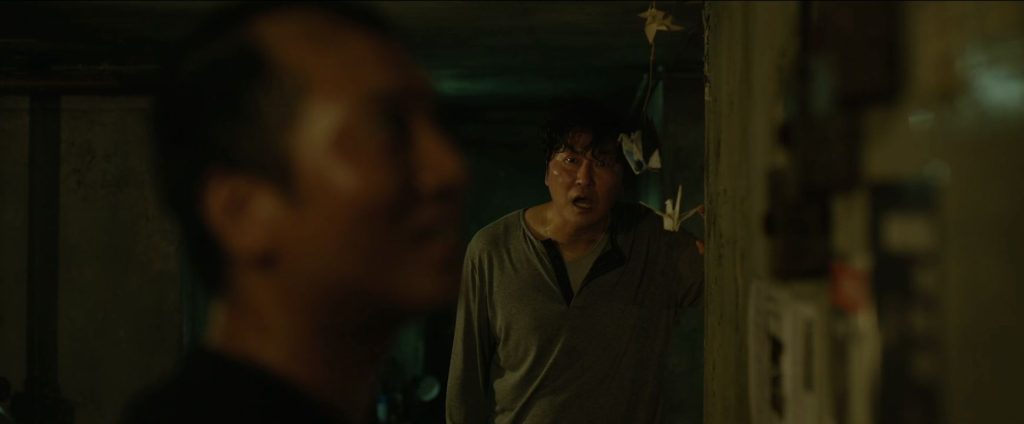
The second theory does the opposite, relying too heavily on the recent events of the plot as the motivator for Mr. Kim’s outlash, even though much of what Ki-taek takes issue with at that time is not directly related to Mr. Park’s own actions. Sure, it’s clear that the Parks are very much ignorant of said issues, but ignorance as a motivator for outright murder seems too weak, so it doesn’t really give us a good narrative reason for Ki-taek’s “surefire kill”.
To help us fully understand why Mr. Kim killed Mr. Park, we need to discuss a character who was vital to the film’s climax and had complex relationships with the others – we need to discuss Geun-se, since there’s much more to him than just his smell!
I posit a third theory, which I think explains the rationale underlying the murder of Mr. Park and ties into the wider message of the film, too: Mr. Kim killed Mr. Park in an attempt to spite Geun-se. In doing this, Mr. Kim broke himself out of the intra-class warfare which all the servants of the Parks, both past and present, were stuck in before.
This might sound like a bit of a complicated conclusion, but I’ll explain it as best I can – before we do that, though, it’s important to have some context, and it might have been a while since you watched the film. So, let’s do a quick overview of the characters I’ll be focusing on in this post:
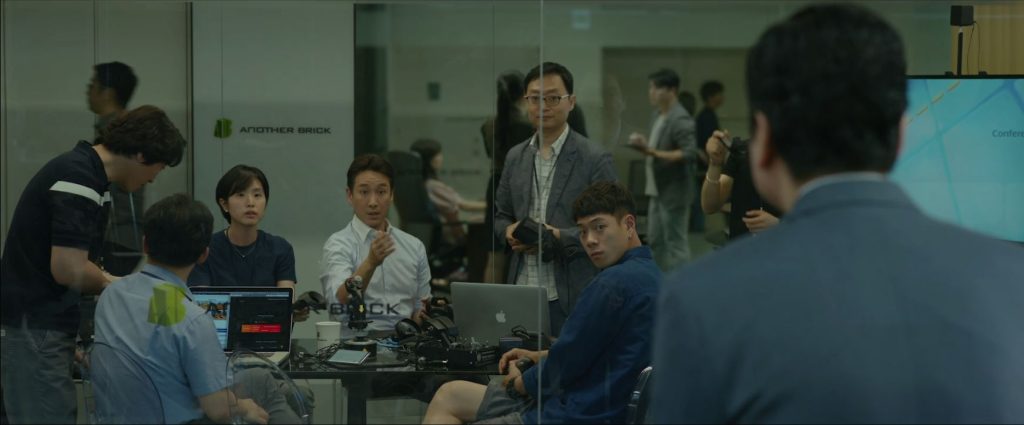
MR. PARK / Park Dong-ik
…is the patriarchal head of the Park family. He’s the CEO of a tech company, although not much screen time is devoted to explaining what his work life is actually like. Regardless, the film does a pretty good job of conveying just how rich (and just how out of touch) his character is.
He is the sole breadwinner of the Park home and is involved in most of the decisions regarding which servants the house employs. As previously noted, Mr. Park often comments on the smell of certain people, sub-textually referring to his dislike of the poor. His frequent comments and confusion about said smell help convey to the audience that Mr. Park has never been in a position of poverty – or anything even close to that – in his life.
Unsure about where such a smell comes from, he’s clearly not the self-made, from the ground up type. He’s more the modern Korean elite type. Not only does he lack empathy for the poor, but it’s essentially like they don’t even exist for him, as he never acknowledges the struggles of others and constantly pushes away those he deems as lesser than himself.
We don’t see that much of Mr. Park in the film compared to some of the other characters; the Park we probably see the most of is the head of the domestic realm, Yeon-kyo, the mother of the Park family. Often seen trying to impress her, we have:

MR. KIM / Ki-taek
…the alleged head of the Kim family. He’s not really in command of his family unit in the same way Mr. Park appears to be. For instance, he receives tutelage from his son when trying to get the job as the Park’s driver, and at the start of the film, he is not the main breadwinner of the house, working the same pizza-box-folding-job that the rest of his family does.
Compared to the Parks, the power dynamics between the Kims are a little more confused and less traditionally structured, which stems primarily from the fact that the income gained from each member of the family is (presumably) equal and all comes from the same source. As none of them earn more than the others, none of them really get the executive domestic authority to direct expenditure. The Kims are an interesting albeit subtle commentary on how modern capitalism and work culture can shape the domestic realm – but I digress; that discussion is for another day.
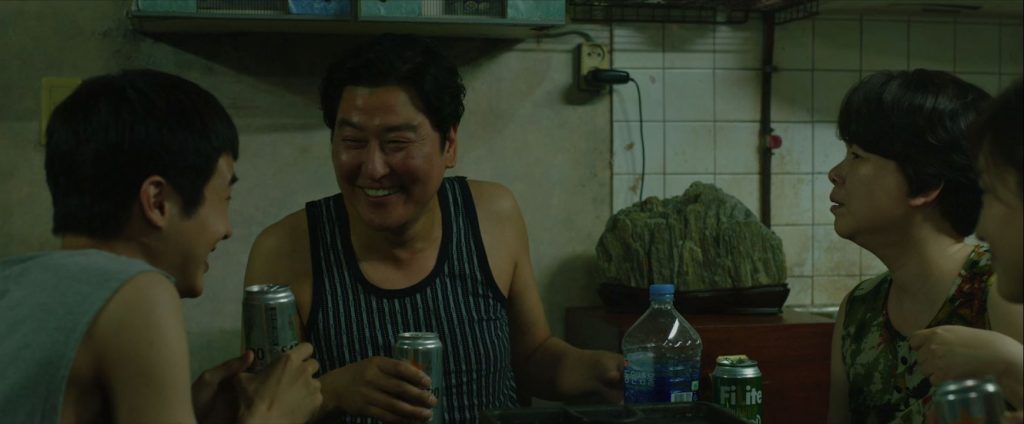
Let’s get back to actually talking about the man himself: as mentioned prior, Mr. Kim tries quite hard with the Park family, showing a great deal of respect and genuine interest towards them in an attempt to establish a bond with his employers. Mr. Kim is very friendly with Mr. Park, sometimes to the point where he becomes distracted from his job.
During certain scenes, Mr. Kim tries hard to be more approachable when Mrs. Park appears vulnerable. While Mr. Kim is still manipulating the Park family, he shows the most appreciation and gratitude towards the Parks and at least to some degree looks up to them. At least, he does for most of the film, until his house is flooded and he has to work an extra shift the day after while Yeon-kyo does nothing but chat on the phone to people about how much of a “blessing” the rain was.
The general ignorance of the Park family does eventually test the patience of Mr. Kim as he becomes more aware of just how out of touch they really are. People often attribute Mr. Kim’s murder of Mr. Park to events and dialogues such as these, but like I said before, I think it runs a little deeper than this. That’s why we’re going to be talking about another character, key to understanding the motives behind Mr. Kim’s sudden attack.
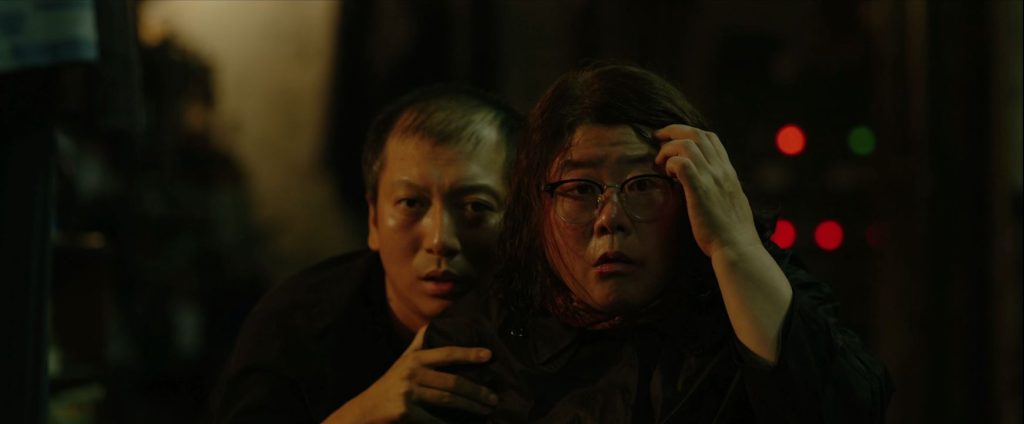
GEUN-SE / ‘Basement Man’
…is the husband of the Park’s first housemaid, Moon-gwang. Escaping from his old life of debt and poverty, now laying low (literally low; underground even!) to escape loan sharks, Geun-se lives in the hidden basement of the Park’s home.
Having worked as a housekeeper for the previous owner (the architect of the building), Moon-gwang sneaked her husband Geun-se into the basement four years before Parasite’s plot took place. Since Geun-se is introduced later on as the secretive but climatic character of the film, not as much time is devoted to developing his overall characterization in comparison to some of the others – but from what we can gather, the guy is a little bit…unhinged, to say the least. He has a strange but deep respect for Mr. Park, despite them never having met before, and he is determined to communicate with the Park family via Morse code.

Weirdly, basement man and Mr. Kim share some similarities. Geun-se used to run his own Taiwanese Cake Shop in the past, just like Mr. Kim did before his family turned to box folding.
This actually has a little bit of real life contextual backstory: after the South Korean financial crisis in 1997, many middle class families, unable to find any reliable full time work, became self employed and opened up their own small businesses. Most of these were food based; many were fried chicken joints and confectionery stores run in a ‘mom-and-pop’ style.
However, because so many of these businesses emulated the same trends at the same time, most failed to gain enough momentum to become profitable, leaving many families in an even worse position than before – especially if they had borrowed money to fund their entrepreneurial efforts.
Both Geun-se’s and Mr. Kim’s businesses had failed since the cake trend died off, with the main difference being how that ended for them. We have to read in between the lines to get this, but it appears that while Mr. Kim was left in poverty and had little to show for his past work, Geun-se had been buried even deeper in the sand. He borrowed way too much to try and get his business running, likely trying a little harder and a little longer than Mr. Kim did, until he eventually had to run from his financial woes.

There is an implication that Geun-se was led on by the idea that he could become a self-made rich man, that he could become someone like the Parks if he just tried hard enough for long enough. Since then, Geun-se has somehow having deluded himself into believing that Mr. Park “gives” him a place to stay and food to eat, trying to portray him as a generous character and a role model.
Geun-se’s over-commitment to the game of capitalism ended up being his downfall, landing him in the lowest basement of all – and yet, he’s still somewhat intoxicated by that dream to an extent, praising the achievements and alleged benevolence of Mr. Park, implicitly aspiring to his position and believing that (if he tries hard enough) he will receive validation from the rich and powerful above him.
Mr. Kim and Geun-se, then, have quite a bit in common. They both ran the same sort of business, they both failed, they’re both ‘parasites’ of the Park family, but also worth noting is that they both have a great deal of respect for Mr. Park. They also both commit murder, but that’s not as quite as relevant to the points I’m going to make. That’s the result of the points I want to make, so I guess it ties their characters up quite neatly.
Now that we’re back up to speed, let’s unpack the final part of that climax. I’ll discuss why understanding Geun-se’s character and what he represents is so important when considering the motivations underlying Mr. Kim’s murder. Then I’ll discuss some aspects of the aftermath – mainly some of the more subtle symbolism you might have missed – and how some of Mr. Kim’s later actions help differentiate him further from both Mr. Park and Geun-se.

THE TARGETS OF VIOLENCE
Let’s just get straight into the gruesome bits, shall we? On his murder spree, Geun-se takes aim at the people he holds directly responsible for the problems in the Park household and in his own life. Aside from Ki-woo (who he hits over the head with the seminal rock) basement man takes aim at Chung-Sook, seeking revenge on behalf of his wife, whom she killed.
However, after coming into the garden and arriving at the party, it seems clear that basement man was primarily targeting Ki-jung, the daughter of the Kim family. Geun-se holds her responsible for not only manipulating the trust of the Parks in general, but also for exploiting Da-song’s alleged mental illness to gain her position in the Park’s home.
Geun-se actually plays quite a large part in Da-song’s life without anyone else even realizing it. As the audience knows, the ghost that Da-song saw on the stairs when he was innocently eating his cake was Geun-se. As we also know, Geun-se has been trying to communicate with Da-song in Morse code ever since he got stuck in the Park’s secret basement, and Da-song has tried (at least once) to decode it.
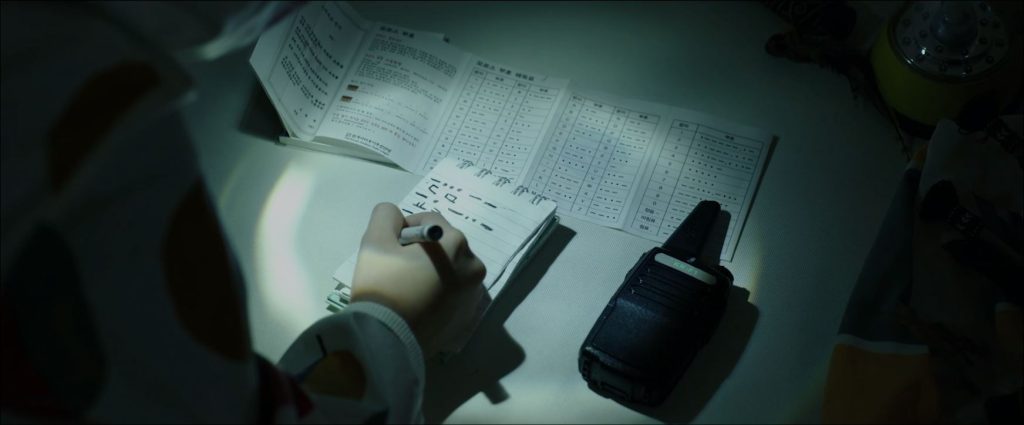
Geun-se has the strongest ties with the youngest member of the Park family, even if their relationship isn’t really mutually reciprocated and Da-song doesn’t really understand who Geun-se is. This highlights the weakness of Geun-se’s position in the Park’s house, only being acknowledged in any way by the most powerless member of the Park family.
So, when Ki-jung comes along and starts with her whole art therapy bit (which is a complete sham of a scam, as she knows next to nothing about art therapy), Geun-se interprets that as an attempt to erase him from the conscious memory of Da-song. From Geun-se’s perspective, this as an exploitation of Da-song’s actual needs: art therapy is useless for the kid, since he didn’t imagine that whole ‘thing with the ghost on the stairs’ happening – that actually happened, and it was basement man’s only real acknowledgement from the Park family.
Both Ki-jung and Geun-se are fighting for the validation of the Park family on some level, and they are both using Da-song to achieve that end. So, without even him even realizing it, Da-song’s mental condition literally manufactures intra-class conflict that culminates in the death of both Ki-jung and Geun-se.

Let’s step back for a minute, because right now you might be thinking: “what does all this have to do with Mr. Kim killing Mr. Park? You’re not even talking about either of them here!”. But bear with me for a moment. If we dig a little deeper and discuss the root cause behind this conflict, we begin to understand it’s systemic nature; Ki-jung and Geun-se wouldn’t have to fight one another to maintain their position in the Park’s home if they weren’t entrapped by the debt and poverty perpetuated by the existing system which serves to benefit (you guessed it!) the Parks in the first place.
This is where Mr. Kim and Mr. Park tie into our discussion: Ki-taek’s murder of Mr. Park shows his understanding of this deeper issue. When Mr. Kim takes aim at the patriarchal head of the Park family, he is telling us he recognizes that it’s the people with power who are the true perpetrators of all this class warfare in the first place.
Ultimately both Ki-jung and Geun-se stand to gain from a relationship with the Park family, but because of the way the Parks set this up, the two must fight each other in order to sustain this connection. Via his murder of Mr. Park, Mr. Kim is leaving behind the internal class conflict which they had all participated in earlier. Rather than continually and needlessly attacking those people in his own class like Geun-se did (and Moon-gwang when she was alive), Mr. Kim begins to see how much the upper class had divided them all.
Once this class division leads to horrible divides and a death in his own family, he understands the only way to truly resolve this conflict is via systemic change, and the only way to get that change is to attack those at the top.

RESPECT!
We would think that Geun-se’s actions at the end of the film are primarily motivated by the murder of his wife, but like I mentioned earlier, his last words make it clear to us that basement man is heavily motivated to hurt the Kim family in an attempt to protect the Parks.
When Geun-se finally meets Mr. Park, he idolises the guy. He doesn’t want to ruin Da-song’s party, or be seen as threatening the Parks – but now, finally out of the basement, this is the only real chance Geun-se has to get rid of the Kims from the Park household once and for all: he sacrifices himself for them.
We can never know for sure, but I think Geun-se’s (semi-irrational) logic sort of went like this: “if I manage to make a real scene by killing those posers, the imposter Kims who have taken my wife’s rightful place in the household and have gotten rid of my connection to the Parks, then I can avenge my wife and finally out the Kims as total frauds, thereby receiving great praise from Mr. Park himself!”.
Of course, this isn’t quite what happens. Yes, Geun-se does ‘get rid’ of the Kim family in the sense that they won’t be working for the Parks anymore, although it’s debatable as to whether or not he really avenged his wife since he didn’t manage to kill Chung-sook. More importantly, Geun-se does not receive any appreciation from Mr. Park, who is (at best) very confused and distressed by the situation.

Maybe in the distant future, Mr. Park could be happy on some level that Geun-se did what he did to get rid of the Kims, stopping them from exploiting his riches – but at that moment (and ignoring the fact that Mr. Park ends up dead, of course), Geun-se and Mr. Park’s relationship is defined entirely by miscommunication.
Mr. Park does not understand the underlying motives behind Geun-se’s actions, nor does he really care. He just needs to take his son to the hospital, and is simply held up by how confusing basement man’s appearance is to him. Mr. Park doesn’t even care that Geun-se is probably going to die right in front of him – nor does he so much as comment on the fact that Ki-jung or Ki-woo are on deaths door either.
Yet still, right up until his dying moment, basement man has nothing but “respect!” for Mr. Park. It’s the only way he can die feeling like he’s actually done something, having martyred himself for the rich.

This is where Mr. Kim comes in. When Ki-taek watched his family die to the hands of Geun-se, he didn’t feel that basement man’s own death was truly enough retribution for what he happened to the Kim family. Ki-taek killed Mr. Park to kill the only other person that Geun-se respected, to completely remove the ideations Geun-se had.
It meant basement man’s sacrifice was now completely in vain – he had gotten himself killed to protect the Parks, but it was his actions which served as the catalyst for the murder of Mr. Park in the first place. Mr. Kim himself had little to lose: his daughter had just died, and from what he could see in the moment, his son was gone too – so why not take the life of Mr. Park, the last person Geun-se felt like he had in his life, the only character which motivated Geun-se?
This lets Mr. Kim further differentiate himself from Geun-se when before they used to share quite a few similarities. By murdering Mr. Park, Mr. Kim is tell us that he has completely lost faith in the prevailing economic system and its ability to do good for him – a dream basement man never really gave up on and became deranged as a result of.
Ki-taek stopped believing that Mr. Park could help him, and after it became clear that they would never be able to truly see each other as equals, Mr. Kim had nothing worthwhile left in his relationship with Mr. Park anymore. He stopped being fooled by the idea that, maybe one day, his relationship with Mr. Park could lift him out of poverty, and realized he was just an object for the Parks.

THE HEADDRESS AND THE LINE
…In a way, Mr. Park does like Mr. Kim. He gets on with him, and they enjoy talking to each other. But Mr. Park never wants to get too friendly, he doesn’t want to appear too close to one of his subordinates.
While we see Mr. Kim fantasize at one point about their families marrying, it’s quite clear that Mr. Park does not share the same idea. Instead, Mr. Park creates a sort of boundary which he simply calls “the line”. What constitutes as crossing the line? Well, we can gather than he’s not a fan of his subordinates being too intimate with him personally, nor does he take well to servants who treat their job as ‘too fun’.
Mr. Park never lets Ki-taek push past this boundary, even if he lets him get incredibly close to it. Mr. Kim feels like he’s on the edge of moving up in the world, trying to forge a genuine connection with Mr. Park which could help improve his class mobility. So, Mr. Kim is always about to cross that line – he’s very friendly and occasionally intimate with both Parks and he’s never seen without a smile when working as a driver…

…Except for the time he had to drive after his house got flooded – and that’s where the turning point was.
While lying on the floor of the Park’s home before the flood, Ki-taek heard Mr. Park discuss the concept of “the line” in detail, from which he learned that he could never truly form a genuine friendship with the Park family. Then after the flood, he hears Mrs. Park talk about the blessings of the rain, completely (and perhaps willfully) ignorant of the events below. Ki-taek no longer sees the Parks as potential friends and good connections – he is merely another person which the Parks use, and they are incredibly out of touch with both his life and the actual lives of others.

Interestingly, all this influences how Mr. Kim actually commits the murder. Mr. Kim wants to distance himself from the rich and highlight their differences when he decides to murder Mr. Park, disuniting and disassociating himself from Mr. Park as much as possible beforehand. After swiftly approaching with a knife in hand, he spins Mr. Park around in order to:
a) make sure Mr. Park knows who killed him, and
b) to remove both their headdresses
Mr. Kim does this in an attempt emphasise their differences, removing the faux similarities which created a pretend unity between them only a minute ago. While the Indian headdresses are obviously very culturally tone deaf and drive home the point regarding the Parks general ignorance of genuine struggles, the headdresses are really there to signify a very heavy irony.

The Native American population once comprised a diverse and innocent community, but were later unified in a fight against an oppressor – the new colonial settlers who moved into America. Now remembered by the token commercialism sat atop both their heads, the unjust violence the less privileged were forced to suffer is trivialised by the very same socioeconomic class that caused those harms in the first place.
Mr. Park is pretty far from oppressed and quite a lot closer to oppressor, keeping the poor at arms length and using them for his own instrumental needs. And yet, through this imagery, he’s trying to create a fake, meaningless bond with Mr. Kim, who (eventually) sees right through it. In removing his own headdress and then removing Dong-ik’s, he strips away this completely fake unifying force which kept them together before.
(caption) we can see that after the knife strike, there’s a nice little visual metaphor included by Joon-ho; Mr Kim is seen “crossing the line” as he flees from the scene. If you watch the black and white version of Parasite, the change in colour contrast is able to highlight this visual best.

THE SECOND BASEMENT MAN
When Ki-taek puts himself into exile and hides in the basement, he’s making a serious sacrifice. He might never return to his old life, it’s highly unlikely that he will ever see the rest of his family again, and his freedom has been stripped away from him completely. Some might point at Mr. Kim taking Geun-se’s place in the basement as a similarity between their characters – but I don’t think it is, really. They’re hiding in the same place, but for different reasons.
Once Ki-taek establishes himself in the basement, he does things differently; he isn’t trying to communicate with the new family in the house, and he doesn’t show much appreciation for them. He’s genuinely all alone – the housekeeper won’t want to help him, so he has to become self-sufficient.
But what’s really important in distinguishing them is the fact that while Mr. Kim is also learning Morse code, he’s not trying to communicate with the boy scout son of the rice above him – he’s instead trying to communicate with his own family, the people he knows he can depend on, the people who don’t see him as invisible or lesser.

One important thing to note here is how their respective recipients decoded their Morse code messages. This Quora post I found summed it up very well:
“The young boy DID solve the Morse code. But in a different language. The Morse code was delivered by the basement man who had learnt it in Korean…But the Morse code learnt by [Da-song] was in English, from the scouts group he joined in his rich-man’s-school. So when translated, it didn’t make sense to the boy…[he] had learnt his Morse code in the scouts group, which has origins from America/the Western world. The rich in Korea like to associate themselves with American brands and products just because it is perceived to be ‘better in quality’. Being able to afford American products is a form of flaunting their wealth…[When] basement man is trying to communicate with the rich family, the most he can manage is Korean Morse code. Rich boy [Da-song] has learnt English Morse code and hasn’t been exposed to Korean Morse code so he can’t understand the message…Korean Morse code is seen as inferior to English Morse code and deemed irrelevant in the current age since it’s tacky and associated with the poor. Rich boy thus doesn’t consider the Korean Morse code and dismisses the light as faulty, failing to understand the basement man’s cry for help.”
Geun-se was doomed from the beginning. No matter how hard he tried with his Morse code strategy, he was destined to be ignored by the older Parks since he was completely misunderstood by Da-song. The rich in South Korea have become so divorced not only from modern realities for most people in their country, but also from aspects of their own culture which they deem as ‘lesser’. The Parks are constantly trying to disassociate and detach themselves from the everyday people in an attempt to gain validation of their own from their rich friends abroad.
When compared, we can extend this discussion to Ki-taek and Ki-woo’s communication at the end of the film. The Korean Morse code is actually understood by Mr. Kim’s son, who went to the regular old Korean boy scouts group in his country. Ki-taek is reaching out to someone he knows he can trust and someone he knows will understand him.

Unlike the original basement man, Mr. Kim is not ashamed of his past, nor his class position; he’s not aspiring to riches or creating some strange, elaborate and unrealistic scheme to get out, nor is he embracing the alleged benevolence of the family that now lives there. Instead, he metaphorically buries the intra-class war firmly in the past by putting Moon-gwang in a grave and giving her a “proper send-off”.
Sadly, Ki-woo and Ki-taek are still blocked from ever seeing each other ever again due to the circumstances they are now both trapped in. While Ki-taek might able to communicate with his family from the rich home he is now stuck underneath, Ki-woo is still unable to communicate with his father at all. His letter at the end remains unsent. Choi Woo-shik, the actor who plays Ki-woo, estimated that it would take 564 years for Ki-woo to earn and save enough money to buy the house – but he did also add:
“I’m pretty sure Ki-woo is one of those bright kids. He’ll come up with some idea, and he would just go into the German family’s house, and I think he will rescue his father.”
The film itself is not optimistic for the Kim family’s future. The respective actor is cautiously optimistic, and hopes that Ki-woo will essentially invade the rich home – but there’s no guarantee that plan would work well for him. Ultimately, Parasite tells us that while targeting the systemic causes of injustice is necessary, it does not come without cost and sacrifice.

THE END?
Ki-taek’s murder of Mr. Park is more complex than it initially appears. Sure, Bong Joon-ho wanted to end the film with that “surefire kill” to really raise the roof on the climax, and it did shock us all in the immediate aftermath. But Mr. Park’s death becomes a whole lot more interesting once you factor in how a longer running conflict with Geun-se might have influenced Mr. Kim’s actions, because then we’re talking intra-class conflict, rather than just the rich-versus-poor.
There’s so much subtlety in Parasite. Every inch of every scene is dripping with symbolism of some sort, and I think there are still many stones yet to be turned over. If you’re looking to scratch the Parasite itch after your initial viewing, why not watch the black and white version of the film? It’s really quite the experience, and as I briefly covered, it greatly intensifies some the visual metaphors that are presented throughout. I would also recommend some more of Bong Joon-ho’s films, particularly the Snowpiercer, which covers similar themes in a different manner. It’s not for the faint of heart, and it may be a bit less subtle, but it’s a thrilling ride packed with a lot more action if that’s your kind of thing.
For now though, I think I’ve said enough. If you’ve got the time, go and watch any of the above mentioned. Just remember, not everyone deserves your “RESPECT!”


